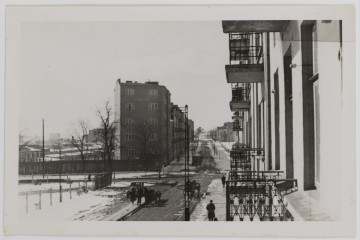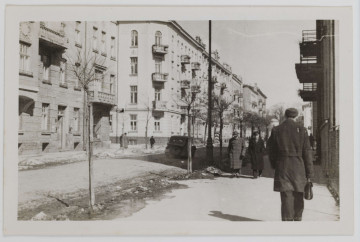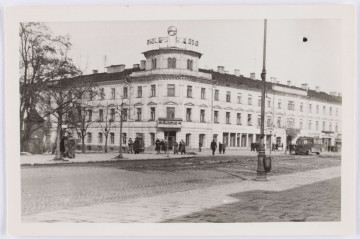
Photocopy: Skłodowska Street
1939-1944
National Museum in Lublin
Part of the collection: European classics of modernity
Born in the Romanian town of Leorda, Wojciech Weiss began his education at St Joseph's Gymnasium in Lviv, and after his family moved to Kraków, he matriculated at St Anne's Gymnasium. In parallel, from 1890, as a free student, he took part in drawing courses at the Academy of Fine Arts. There he decided to study between 1892 and 1896. After a short fascination with the historicism of Jan Matejko, he was admitted to the master class of the modernist Leon Wyczółkowski. In 1898, he met Stanisław Przybyszewski, who had just accepted a position as editor-in-chief of the literary and arts weekly Życie (Life). The catastrophic vision of the world borrowed from Przybyszewski became a hallmark of Weiss's decadent period. The year he left Wyczółkowski's studio (1899), he produced paintings rich in visual references to the work of Francisco Goya and Edward Munch. Between 1900 and 1901, Weiss visited Paris, where he was awarded a gold medal at the World Exhibition for Portret rodziców [The Portrait of Parents] (1899). In 1904, he visited Kalwaria Zebrzydowska for the first time, where he found a home for his parents and his second-place of artistic activity after Krakow. The move came a year later, marking the beginning of the idyllic, the so-called white period in Weiss's œuvre, inspired by the orchards surrounding the manor house, the picturesquely undulating terrain of the Wieliczka Foothills and the architectural monuments scattered around it. The arrival of Irena Silberberg complemented the idyllic atmosphere, a former student of Konrad Krzyżanowski, Karol Tiche and Xawery Dunikowski in Warsaw and Simon Hollósy in Munich, who in 1908 became Weiss's wife. The wedding took place in nearby Zebrzydowice, which also appears in the artist's paintings. The work from the Szczecin collection, created during a period of fascination with Paul Cézanne's saturated colour palette, depicts the Church of the Crucifixion in Kalwaria Zebrzydowska - the oldest building in the pilgrimage complex, founded in 1600 and extended 23 years later in the early Baroque style.
Szymon Piotr Kubiak
Author / creator
Dimensions
cały obiekt: height: 43 cm, width: 63 cm
Object type
painting
Creation time / dating
Creation / finding place
Identification number
Location / status

1939-1944
National Museum in Lublin

1939-1944
National Museum in Lublin

1939-1944
National Museum in Lublin
DISCOVER this TOPIC
National Museum in Szczecin
DISCOVER this PATH
Educational path